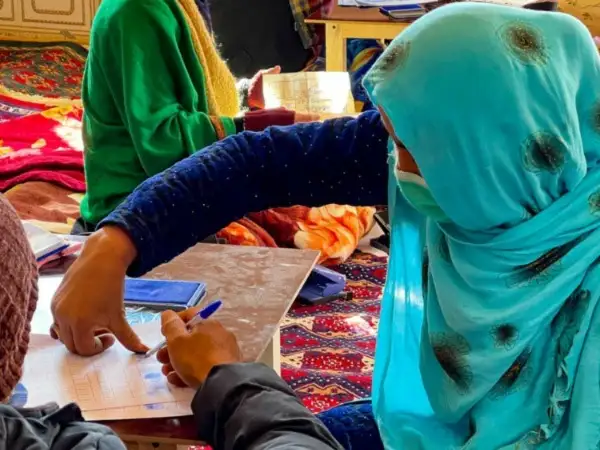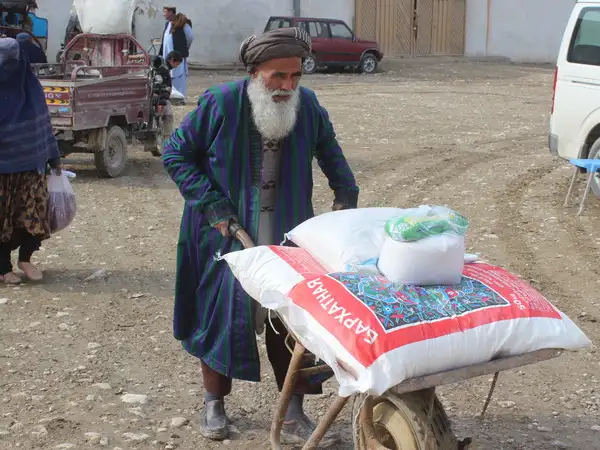Your support will help us reach vulnerable people caught up in this crisis.
On Sunday 31 August at 11.47pm local time, a magnitude 6.0 earthquake hit eastern Afghanistan while families slept.
The earthquake made buildings collapse and destroyed entire villages, sadly taking lives and leaving thousands of people trapped under the rubble. It was a shallow earthquake, occurring just 5 miles beneath the surface, and its proximity made the impact even more severe.
After the initial quake hit, multiple large aftershocks followed, which sadly caused more deaths. It is estimated that 1,400 people have died and 2,000 have been injured, with many people still trapped under the rubble.
How is CAFOD responding to the earthquake?
When the earthquake struck on Sunday our local partners, who are experts in their local communities, responded quickly with life-saving support. To help them immediately, we released £50,000 in emergency funding. The funds are directed towards assisting families severely affected by the earthquake.
Our local experts are safe and are tirelessly helping families to receive urgent aid thanks to support from people like you.
Inaccessible villages, far from the nearest tarmac road, are now cut off from rescue efforts. Hundreds of mud houses are destroyed, others swept away by mudslides. With winter around the corner, providing tents and hygiene kits to prevent disease will be vital.

Afghanistan Crisis Appeal
Our incredible partners are working urgently to help as many families as possible. They are providing life-saving aid, this includes:
emergency blankets, kitchen sets and hygiene kits
temporary shelter, particularly tents for people who have lost their homes
food and cash assistance (cash assistance means giving families money to buy essentials like food)
ensuring women and girls receive fair access to aid
mental health support for children and caregivers (many children have lost parents and family).
Where did the earthquake strike?
The earthquake struck in eastern Afghanistan in Nangarhar Province, near the Pakistan border, 17 miles from Jalalabad (Afghanistan’s fifth-largest city).
The mountainous regions are one of the hardest-hit areas, as roads have been cut off due to landslides and rocks, leaving families trapped. The most vulnerable communities were hit hardest, as poorly built structures suffered the greatest damage from the earthquake.
Grace How, CAFOD's Country Representative for Afghanistan, has said:
"Inaccessible villages, far from the nearest tarmac road, are now cut off from rescue efforts. Hundreds of mud houses are destroyed, others swept away by mudslides. With winter around the corner, providing tents and hygiene kits to prevent disease will be vital."
How you can respond to the earthquake in Afghanistan
Join us in prayer for the people of Afghanistan.
What was the situation in Afghanistan before the earthquake?
Before the earthquake, many families were already experiencing extreme poverty. The World Food Programme has reported that 9.5 million people in Afghanistan are severely food insecure and 4.6 million mothers and children are malnourished. Around 22.9 million people – almost half the country’s population – are in need of humanitarian assistance, according to figures from the UN Office for the Coordination of Humanitarian Affairs.
The situation in Afghanistan is highly complex with decades of conflict that have taken a terrible toll on Afghan people, resulting in deaths, injuries and pushing families further into poverty. Drought and coronavirus have added even greater problems for vulnerable families struggling with hunger and healthcare. Prices were already escalating, but the situation in Ukraine has made this even worse.
On 22 June 2022, a powerful 6.1 magnitude earthquake hit the south-eastern region of Afghanistan killing at least 1,000 people, injuring more than 1,500 people, and destroying thousands of homes.
What has the Catholic Church said about the situation in Afghanistan?
On hearing about the earthquake, Pope Leo XIV said on 1 September that he was "deeply saddened by the significant loss of life" and offered his prayers for all who were killed, the injured and everyone still missing. Pope Leo expressed his "heartfelt solidarity in particular with those who mourn the loss of loved ones and with the emergency personnel and civil authorities involved in rescue and recovery efforts".
In August 2021, Pope Francis expressed his “unanimous concern for the situation in Afghanistan”. He called for prayers “so that the clamour of weapons may cease, and solutions may be found at the negotiating table".
In a joint letter to the Guardian newspaper on 26 August 2021, Bishop Paul McAleenan, lead bishop for migrants and refugees of the Catholic Bishops’ Conference of England and Wales, urged the British government "to go further in helping at-risk Afghans, human rights defenders and women activists, and create safe passages so that people can find sanctuary without resorting to dangerous journeys”.


An Afghan woman receives cash assistance for her family
How can CAFOD be sure that aid will get to where it is needed most?
CAFOD started working in Afghanistan in the late 1980s and a core part of our work has been to support Afghan organisations committed to improving the lives of vulnerable and marginalised people, supporting them to earn a living.
We work with trusted partners who are close to the communities they serve and are therefore able to ensure your donation securely reaches those who need it most. Catholic sister agencies are already providing humanitarian aid to affected families in some of the most remote areas of Afghanistan and we are also working with them.
Many commercial banks have limited opening but the situation is still difficult. We are taking careful steps to ensure that our funds reach our partners safely so that they can reach the people in greatest need. Any money transferred to the partners we work with will be done so securely and safely. CAFOD has a robust due diligence, monitoring and verifying process to ensure that donations reach their intended purpose. This can mean it takes much longer than usual for our funds to reach our partners, but with good planning our partners are able to ensure the work on the ground continues.


Food packages are designed to last a family for around two months
What is CAFOD doing to help women and children in Afghanistan?
Women are always disproportionately affected in humanitarian situations. In Afghanistan women have again been disproportionately affected by poverty and escalating conflict, as well as Covid-19, earthquakes, and floods and droughts.
CAFOD's Afghanistan Crisis Appeal will ensure that the most vulnerable people in Afghanistan will be assisted based on a thorough needs assessment. On top of the priority list will be older women, women-headed households, people with disabilities, and pregnant and breastfeeding women.
We will only support programmes that ensure women have full access. We are keen to ensure our local partners’ female staff are able to continue their work.
How you can help
Your support will help us reach vulnerable people caught up in this crisis.
Join us in prayer for the people of Afghanistan.




